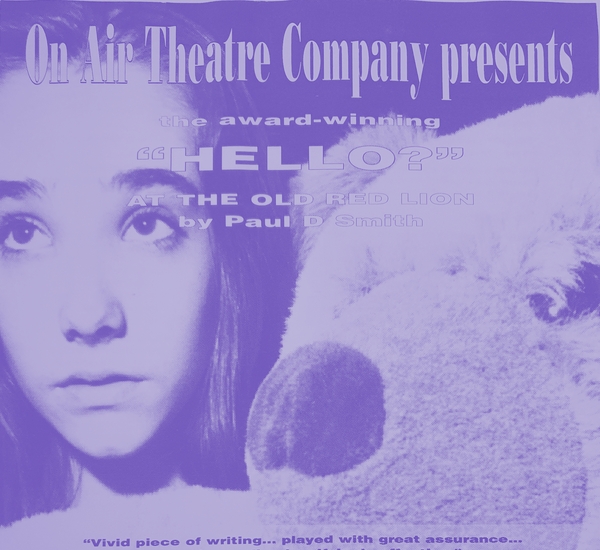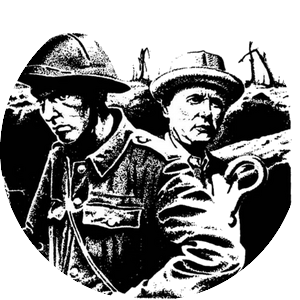The Competition
The Woolwich Young Radio Playwrights’ Competition ran from 1990 until 1998, organised by Independent Radio Drama Productions (IRDP). It was open to anyone under the age of 25 living in the United Kingdom, and in 1994 they received over 320 entries. The judging panel – including Nerys Hughes, Lady Ralph Richardson and Gerard Murphy – selected the final four winners.
The purpose of the Woolwich scheme in terms of radio and theatre production was to give new writers the chance to participate in a professional collaborative environment and discover and appreciate the direction, quality and dimensions of their scripts. My feeling is that most writers can only ‘learn’ for themselves. ‘Teaching’ writing is primarily limited to techniques, devices, examples that work in specific contexts and examples that do not work in either the right or wrong contexts.
Motivation
In 1993, there was an advert in the local paper for The Woolwich Young Radio Playwrights’ Competition, and my mother suggested I write something for it. I was doing part-time youth work at the time, and had recently been told that at 16 I wasn’t considered old enough to go on some training about sexual abuse: my choice for the subject of the play was partially to thumb my nose at that idea. But it was also because I was a writer early in my career.
The idea that writing has to be about something is daunting. A lot of writers – me included – find themselves writing about “issues” early in their careers, because it gives them a “something” that is undeniably important. There is nothing wrong with it, and it doesn’t necessarily mean that the work won’t be good … but it doesn’t guarantee that it will be either, which is I think what we secretly hope when we start writing. Part of the process of finding your voice is developing the confidence to write what you want to say, not what you think somebody else would be willing to hear.
Inspiration
I knew I was going to write something about abuse, and an image that I found somewhere of a young girl with a black eye and split lip was the starting point for the play’s central character. But – with no experience of writing for radio and the iPlayer a good 15 years away – it was thinking about how a radio play could work that gave me the central conceit: in my mind, a radio play would have to be naturalistic and so “explain” how you could hear the voices. My central character became a girl talking on a CB radio, to a passing taxi driver in thirty-minutes of real time.
Getting the Story
At the time I sat down to write, I’d only ever finished a number of short stories – perhaps 40 lines of actual dialogue if you added them all together. Thirty minutes of radio play – thirty pages of text – seemed impossibly long. But I knew who my two characters were, and I knew what they weren’t telling each other: over a few late nights, I discovered that I like writing dialogue. I can lose myself in two characters talking to each other far too easily – my writing needs the discipline of short, focussed scenes otherwise my characters start to ramble. In Hello?, they ramble … but the subtext – and the last scene – just about saved me. That was something I didn’t understand as I wrote it, or even for some time afterwards.
The play was written as it was performed, an unedited stream of consciousness: the version I submitted for the competition was the second draft, but only because the last scene had been slightly rewritten.
Outside Help
In the original draft, the girl is dragged away from her radio at the close of the play to be abused off-stage by her father. I’m fairly certain that if I’d sent that play into the competition, it wouldn’t have won.
But I had the good fortune to know a professional writer.
My drama teacher at the time was Jez Simons: with his writing partner Jyoti Patel, he had become one of the major voices in British Asian theatre, and also written for Eastenders and Emmerdale. Given the opportunity, I of course showed him my play and asked him what he thought. The main comment he made was that instead of having her dragged away from the audience, the girl should be abused while they listen. I made the change, more because he’d suggested it than because I had a lightbulb moment about how it would improve the script.
And suddenly my play of two people rambling at each other had teeth.
Editorial
I heard that I had won the competition when IRDP administrator Marja Giejgo rang me with the good news. This was the first play I had ever finished, and the first I had ever sent to anyone to read. Nothing I had ever finished had been rejected, bar a handful of Doctor Who fan-fiction stories. Marja was amused when she told me I’d won and I replied “Oh, OK”, but I had no expectations or experience to make me think anything else would happen.
When the judges saw the play, they picked it as a winner because they saw it as “a vital, worthwhile, frightening work that stays in the memory” and “a harrowing, totally convincing play”. After the showcase at the Cambridge Theatre, my director and IRDP founder Tim Crook called it “a moving, magnificent, mature piece of theatre that brought people to tears.”
‘Hello?’ is/was a terrific piece of original and dramatic writing and offered a very powerful and truthful dimension to the issue of sexual abuse and exploitation because it was written by a brilliant young dramatist.
Me and my dad went to London to watch Tim direct Julie Smith, David McGillivray and Tony Marshall for the recording that was then broadcast on LBC radio. We spent a day in the studio, with Tim occasionally asking me to clarify my character’s motivations while I pretended I had considered what they were. Then me and my dad did the two hour drive back to Leicester, both of us unsure whether this kind of thing was just what life did every now and again.
A short while later, the whole family came down to the Cambridge Theatre in the West End to watch Hello? get performed on stage, and then afterwards see Leslie Grantham and Melvyn Bragg talk about what a great writer I was. It was an intense experience – I still dream the geography of London I learnt that day, and my favourite memory of my dad is probably watching him retain a polite bemusement as Tony Marshall mistook him for the actor playing the abusive father in the play and spent two minutes laughing about how evil he was.
And the version of the play that was broadcast, performed and then rehearsed for a week for a 4 week run of afternoon theatre was the same barely-second-draft that I’d written in those few long nights when I was 16.
The play did not need significant rewriting and if there were any changes to be made, they happened through the interaction of performers, director and writer during rehearsals.
One of those changes was also the thing that made it so much more effective: the script had the girl as tearful and victimised as she spoke about her abuse, but Tim suggested Julie Smith play her as angry instead. Without changing a line, Tim had suddenly made everything feel more real.
What Happened Next?
It had always been the intention that the awards would present a cross-over between radio and theatre, and that night in the Cambridge was meant to be it. But then Tim Crook decided that Hello? could survive a four week run in the Old Red Lion pub, which had a respected theatre space in one of its upstairs rooms.
What was so interesting about the experience was that fellow professionals of my generation (in terms of writing, acting and directing) could not believe that it could be produced effectively for stage theatre. But we did do it (as a collective creativity) and it clearly had a life beyond the intense and quite remarkable production and single performance at the Cambridge in London’s West End before an audience of about 1,000. Hence, the successful lunch-time theatre-run at the reknowned and respected writing theatre in Islington, London - The Old Red Lion.
Anthony Ofoegbu replaced a busy Anthony Marshall as the cabbie, and David McGillivray was present in pre-recorded voice only, but otherwise it was the same stage version of the play that we rehearsed for a week.
Dale Smith was treated as a professional dramatist whose presence was more than welcome and he supported the production team. He was the model of a professional writer. Always concentrating on what was happening; supportive of the director, direct and clear about what he wanted.
The only change that was made to the script came about because I didn’t make myself clear enough. There was a line in the play where the girl pretends she is blonde and blue-eyed and then makes the mistake of admitting she has brown eyes. The cabbie noticed the mistake, and in the stage version the actor had some fun rolling blue and brown around his mouth. But all I could think was that the cabbie must be pretty stupid to notice the girl didn’t know she had blue eyes, but not realise she was lying to him: I told the director that moment made me embarrassed and I wanted to cut it – meaning the whole confusion over eye colour. He told the cast that I was embarrassed by the actor playing with the line, and it went back to how I’d scripted it … which was the line that embarrassed me in the first place.
The run was very well-received, and even as it closed Tim Crook was asking if I had any other plays that he might be able to produce. By that time I did – I had kept writing plays almost exclusively since I won the competition, although one producer who asked me what I was working on got told about a synopsis I was half-way to writing for a Virgin Publishing Doctor Who New Adventure. I sent Tim the script I thought most likely – another issue play called A Game of Risk, when really my heart was in an Angela Carter adaptation called Wolfsong – but didn’t take the time to really look at Hello? and decide why it had been successful … and, more importantly, what I didn’t like about it and thought I should do differently.
There was also – certainly on Tim’s part – some hope that the play might live on beyond London. He asked about local theatres to me that might be interested in putting it on, and instead of telling him that I had absolutely no idea how any of that worked, I told him that his best shot would be to contact Jez Simons. My thinking was that Jez had had plays on in Leicester, and so was more of an expert than me, but with hindsight I have often wondered what would have happened if I had said “I don’t know” and left Tim to carry out his own research.
If my memory serves me correctly, I certainly did contact the regional theatre in Leicester and they certainly indicated a respect and interest in Paul’s work. I imagine they were unable to follow this up because they did not have a lunch-time production schedule.
Around that time, I did start sending plays into the Haymarket in the hope that they would get produced. None ever did, but they did invite me to join a writers’ workshop that they were running in conjunction with a production of Sue Townsend’s The Queen and I. At the time, I just assumed I’d been asked because I’d shown an interest in the theatre and was the only person under 20 involved. But it seems that Tim Crook and Hello? have had even more influence on my career than I gave them credit for.


